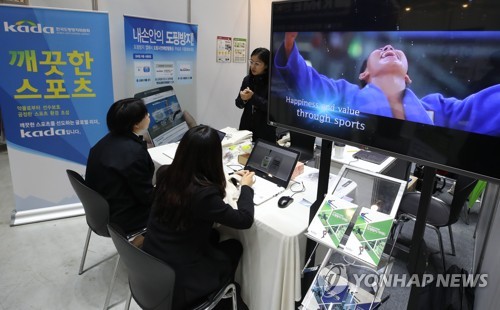- California Assembly OKs highest minimum wage in nation
- S. Korea unveils first graphic cigarette warnings
- US joins with South Korea, Japan in bid to deter North Korea
- LPGA golfer Chun In-gee finally back in action
- S. Korea won’t be top seed in final World Cup qualification round
- US men’s soccer misses 2nd straight Olympics
- US back on track in qualifying with 4-0 win over Guatemala
- High-intensity workout injuries spawn cottage industry
- CDC expands range of Zika mosquitoes into parts of Northeast
- Who knew? ‘The Walking Dead’ is helping families connect
Nearly 80 pct. of student athletes in S. Korea say they will resist temptation of doping
SEOUL, Oct. 26 (Yonhap) — Nearly 80 percent of student athletes in South Korea said they would resist the temptation to dope, even if illegal substance use could guarantee a good performance, a survey from the national anti-doping body showed Friday.
The Korea Anti-Doping Agency (KADA) unveiled the result of its nationwide survey on doping that was conducted with the education ministry. Of 63,029 registered student athletes in the fourth grade of elementary school or older, 40,187 responded to the survey, according to KADA.
The survey showed that 95.5 percent of student athletes had never thought about doping. Asked whether they would say no if they were told or forced to dope, 93 percent of elementary school athletes said they would, while 92 percent of middle school students and 88.7 percent of high school students would also refuse.
According to KADA, 78.8 percent of student athletes responded that they would resist doping even if drug use promised good results in their competition. But only 34.2 percent of athletes’ parents and 23.8 percent of coaches said they would dismiss the temptation of doping in that situation.
Asked whether they believed doping could improve their performance, 13.3 percent of elementary students, 16.8 percent of middle school students and 22.2 percent of high school students answered “Yes.”
“Through this survey, we’ve secured our basic data for the development of an anti-doping environment in schools,” KADA said. “We’ll come up with anti-doping programs set for different age groups and beef up education programs for parents and coaches.”












